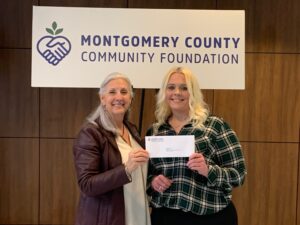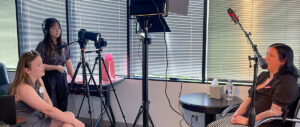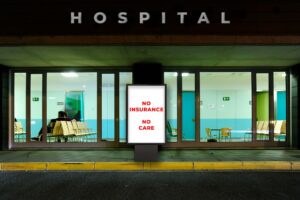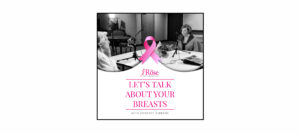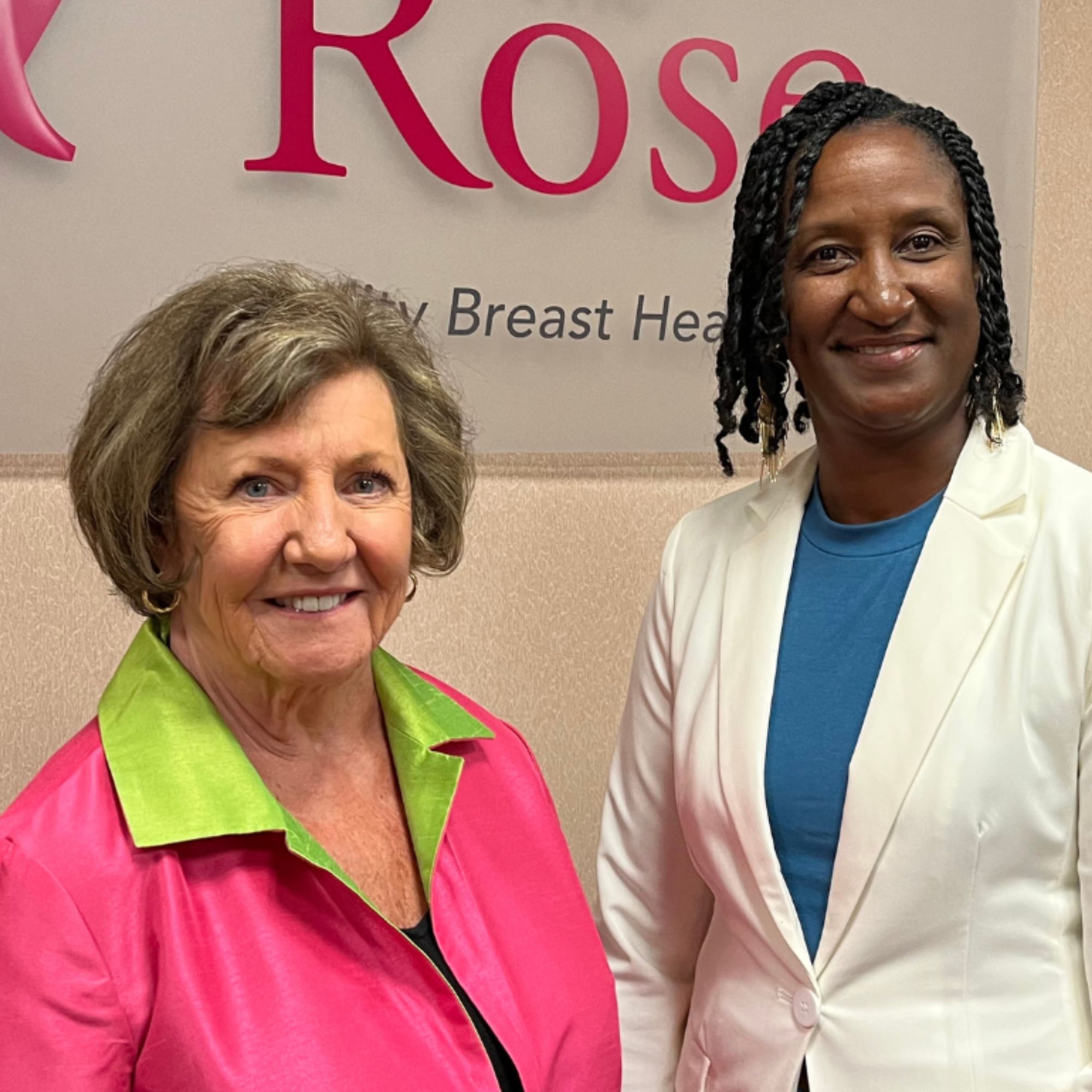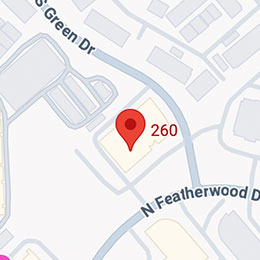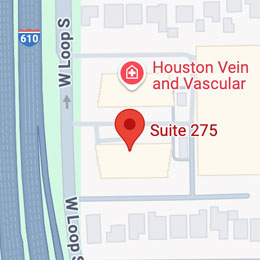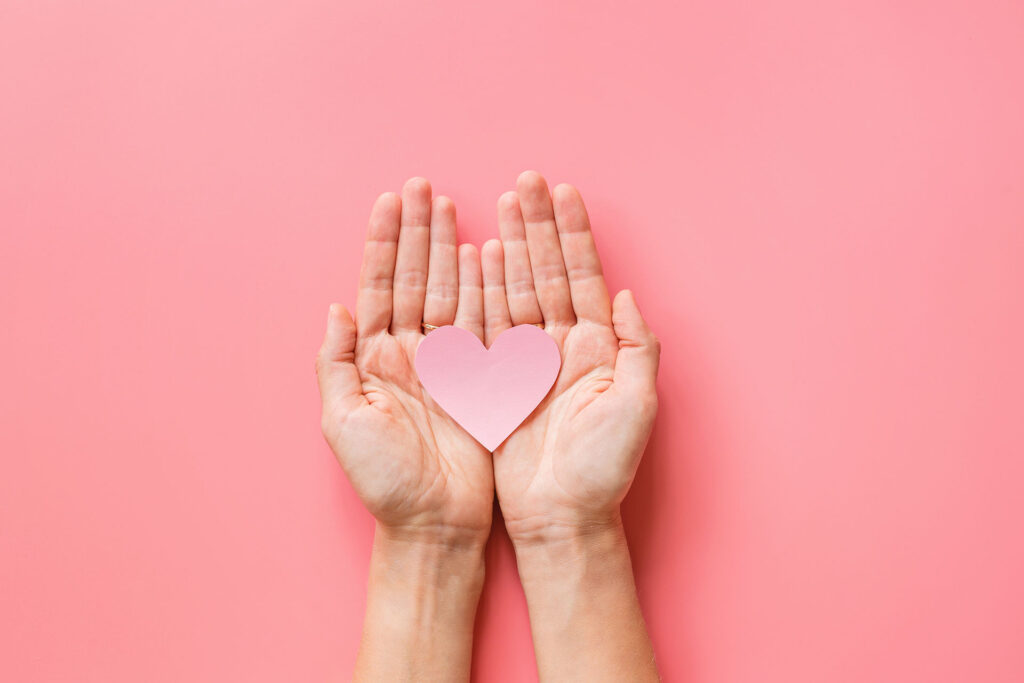Dorothy: [00:00:00] Lorraine Fox never planned to have breast cancer. She’d been an athlete all her life. She was used to discipline and hard work. She could bounce basketballs as well as any man in her life. Now a 27 year breast cancer survivor, she’s turned her experience into something that involves the whole Fox family and raises hundreds of thousands of dollars.
To help women, Let’s Talk About Your Breasts, a different kind of podcast presented to you by the Rose Breast Center of Excellence, and a Texas treasure. You’re going to hear Frank discussions about tough topics, and you’re going to learn why knowing about your breast could save your life. Join us as we hear another story, and we answer those tough questions that you may have.
Lorraine has, uh, such a fascinating story, primarily because you were diagnosed so [00:01:00] many years ago. Tell us just, uh, how old were you, and how did you find out, and…
Lorraine: I was 33 when I was diagnosed with breast cancer. The way I found out was, I… was doing just a routine self exam, which I didn’t normally do. I don’t even know why I did it that time.
And I found a lump in my left breast. I waited a couple of days and I did it again. The lump was still there. So I made an appointment with my general practitioner doctor, and she did a self exam and she said that, you know, well, she do feel a lump too, and she wanted me to go and have a mammogram. Now, that was not my first mammogram because I had a baseline mammogram a couple years earlier because I had a sister that was diagnosed when she was 28. With breast cancer.
And because that kind of [00:02:00] created a family history, uh, she sent me to have a mammogram. Well, the mammogram, you know, showed that there was a lump there, but it didn’t, didn’t tell if it was cancer or not just from the mammogram because it was a solid, it was a solid mass. So after the mammogram, Uh, they told me to go have an ultrasound, and on the ultrasound, it also showed the mass.
It was solid because they thought, well, maybe it’s a cyst and we can aspirate it or whatever, but because it was solid, they said it, it wasn’t a, um, it wasn’t a cyst. So after, um, the ultrasound, my doctor didn’t think it was, you know, that. make of a deal, but because of my age, but, um, for me, I knew that, okay, there’s something here that wasn’t here before.
So that’s why I tell a lot of [00:03:00] people that you need to kind of be an advocate for yourself. Don’t, uh, just take that one opinion and just stop at that. And so. I went back to my primary care doctor and she suggested that I see a, um, a surgeon to maybe just do a biopsy to, you know, see what this is because it wasn’t a CIS.
So I spoke with the surgeon. We had a consultation and then we scheduled the biopsy. We scheduled a biopsy like on a Friday and it was a, you know, one day surgeries. I went in and had the biopsy. And then I traveled from Louisiana to Houston because I had to, um, come to help out Houston at my work. So I’m in Houston for a couple of days.
And you know, when you’re waiting for, Any type of medical results. It’s like, oh my [00:04:00] God. So, I’m in Houston a couple of days, not getting any sleep, just kind of numb. Going to work, going back to the hotel, working out, going to work, going back to the hotel, working out. So, that I want to say that Tuesday. So I arrived in Houston at Sunday, went to work Monday, hadn’t gotten a call yet, went back to work on Tuesday and one of my co workers let me know that my, my doctor was on the line.
So when I went outside to take the phone call and the doctor said that they had got the results back from my biopsy. And that I had breast cancer. Well, that was to say the least a shocker. And I knew that I had, um, my son was two at the time and I was raising my nephew who was about five and a half. At the time, because my sister who [00:05:00] was diagnosed at age of 28 passed away at the age of 33.
So I had two boys under six that I knew I had to raise. So got the diagnosis that I had, uh, breast cancer. I cried for 30 seconds or so, and then I just had to pull myself together and say, Okay, what do we have to do next? Because I have these two little boys, one had already lost one mother to breast cancer and I was not going to let another one, let him lose another mother.
So we’ve made the, I got back to Houston that, uh, end of the week and we made the appointment. We had, um, lumpectomy. So once we did the lumpectomy, they went and they took out the lump. They took, they went out a little bit farther [00:06:00] and took out lymph nodes so that they, they was trying to make sure that they cleared everything.
I got the results back from the lumpectomy and the surgeon said that they think they got it all. And that all the lymph nodes was clear, all the margins was clear. You should just have to have radiation and then you should be fine. So I was like, okay, no chemo. Yes. No red devil. Yes. My hair won’t fall out.
Yes. Well, when I went to see the radiologist. Um, in the radiologist’s office, they had the results from the biopsy and everything. Well, you know, everything looks fine. Um, because of your age, we would want to do chemo. We would want you to do chemo before you do radiation because you may have some minute…
Microscopic cells floating around in your [00:07:00] body. And we want to make sure that we get everything well, hearing that you have to have chemo after I was so set, like, yes, I don’t have to do chemo. And when he said I, they wanted me to do chemo. That was worse than actually getting the breast cancer diagnosis, for me, because of all the horrific stories that you hear about chemo, how, you know, people get sicker from chemo than they do from the actual breast cancer, and the fact that, uh, Your hair is going to fall out.
So I think I cried longer hearing that I got to have chemo. Then I cried when I got the breast cancer diagnosis. Oh my goodness. So, okay. If we got to do chemo, we got to do chemo. Okay. Just put your big girl pants on [00:08:00] and just do what you have to do. Because if this is the protocol for your breast cancer, then we’re going to do it.
So. After accepting that this is what we gotta do, um, before my first chemo treatment, I decided that, you know what, I’m gonna decide when my hair falls out. So, I went to the barbershop, and I had them to cut it off. Like, just… If it’s going to fall out, it won’t be from the stage it is now. It’ll fall out from, oh, you only have a little so it doesn’t really matter.
So I went to the barbershop and I had them to give me a haircut. And they cut it as low as they could without shaving my head. They cut it low as they could. And after my second, because I initially was told I was going to have six rounds of chemo, [00:09:00] but I only had to have four rounds of chemo, which. Okay, we can get through this a little bit faster.
So I think after the second round of chemo is when, um, like the hair that was left actually fell out, which was fine. It wasn’t like a big shock or, oh my God, it’s like, okay, well, I was at that point where I had, I was accepting it anyway. So we went through that after four rounds of chemo. Then we started the 30 rounds of radiation.
Well, I think I only missed work, um, maybe like a couple of times, but throughout from March, which was my diagnosis, March of 2000 to September of 2000 is when I went through my whole journey of breast cancer . [00:10:00] And after September, I was done with my treatments and then five years after you’re going to see your, um, oncologist, like for first, it was every, Quarter. And then it became twice a year and then it became once a year.
And even so within that process, I moved from Louisiana to Texas. And once I got to Texas, I got connected cause they gave me like some, um, oncologist to keep. So I was following up with the oncologist in Texas, like every, I would see her once a year, every year. And we were past five years out. Actually, we got to 10 years and she was like, you know, Lorraine, you don’t have to come and see me anymore.
And I’m like, just me. Knowing that, okay, you get your mammograms, [00:11:00] you see your oncologist, you, you do, that was just my routine every year. It wasn’t like it was a big deal to not go. It was just something that. This is my life. This is what I want to do. And when she said, I don’t have to come and see her anymore.
I’m like, well, who am I going to see? She’s like, no, you’re, you’re, you’re clear. You’re, you, you don’t have, you’re totally from remission. You don’t have breast cancer anymore. You don’t have to. I’m like, okay. But I still faithfully still have my mammograms every year. I try to, um. Work out, do everything I can, like, I’m a big sweet eater and I’m just never, ever, ever gonna give up sweets.
So I try to combat that with, do exercise. If you want to have your sweets, exercise. And that’s kind of like my journey through this breast cancer life.
Dorothy: But we’re talking 23 years [00:12:00] ago?
Lorraine: So it’s been 23 years ago that, and it’s kind of one of those things where you know exactly where you were. When you got the news.
Oh, yeah. And that’s something that’s, like if somebody say, well, what kind of breast cancer you had, well, I don’t actually remember like the medical terms and all of this, but I do remember exactly where I was when I got the diagnosis.
Dorothy: Yeah. It’s, it’s one of those Days and moments you’ll never ever forget. No. I have so many people this day and age say, Why are so many young women getting breast cancer?
Well, 20 years ago, 23 years ago, young women were getting breast cancer. When we started The Rose, 37 years ago, young women were getting breast cancer. And I get so frustrated because we really haven’t changed our recommendations when I say our, you know, the protocols that, oh, well, if they’re under 40, there’s nothing magic that happens at 40.[00:13:00]
And, and with your history, oh my goodness. But what a responsibility to have two children and going through that time. My goodness. How did, how did you cope with that?
Lorraine: Well, I, I just, um, like I said, I just had to just. muscle up the strength and fortitude to know that, okay, this is my life and it’s not going to end here.
And I got to do everything I got to do to make sure that I stay as healthy as I can possibly so that I can. Raise these two boys. So there was no, you know, you go to a few of what was mean kind of, but I had a good support. I had, uh, my church family was a great support going through when I would go for my chemo treatment.
One of my friends from church would go with me and after the chemo treatment, we would go and have the. We would go [00:14:00] to a buffet because in a couple of days in, you can’t taste your food anymore. And that would last for probably 10 to 12 days because I would have my treatment like every three weeks. And so, The day of the treatment, you’re fine.
You go, um, you go in, you’re in for a couple of hours doing the treatment and then we would leave, we would go eat, we’ll go to a buffet and just eat everything in sight because I know in a couple of days I’m not going to be able to taste this food, so I want to do it now. And then you go to maybe almost, um, about.
10 to 12 days of not really tasting your food, but I would still eat because I need to eat. So it wasn’t, I’m not eating because I can’t taste it. I’m going to eat because I need to eat. And by the time you can taste your food again, it’s time to go back for your next treatment. So that was kind of our routine.
Go to the treatment, go eat. No, we can’t taste it for [00:15:00] almost two weeks. Go to treatment again. And so that was kind of our routine. And that’s, you know, one way I would. Kind of keep my strength up because I know a lot of people that go through the chemo They are so sick that they can’t eat. They’re you know, throwing up or whatever.
I didn’t really experience the Now, the just not tasting the food and maybe a little nausea or whatever, but never the point where it’s so bad that I can’t eat. So I made sure that I kept up my, whatever I had to eat, I ate it.
Dorothy: Yeah. So the, and that is a really important point. Everybody’s cancer is different.
Everybody has different reactions. I think it’s really brave that you went ahead and made that decision about your hair. Do you know many others that, that have made that decision or?
Lorraine: No, none of, all the women that I’ve spoken to throughout my journey. [00:16:00] No, nobody has never said, I, girl, I had to go cut my hair too.
Dorothy: Well, and you know that, that was the one thing you could control.
Lorraine: Yes.
Dorothy: I, I think that, that is another big message. If you have anything you can control, go, go do it.
Lorraine: Control what you can control.
Dorothy: That’s it.
Lorraine: Yes.
Dorothy: Now, the boys, did, did the nephew have? Unusual problems or as he, you know, he’s already lost, like you said, his mother, did he, was he more aware, more frightened?
Lorraine: No, actually, because he was so young, um, with the losing of his mom, he was really young then. And then with me, I don’t think he really understood what, you know, like as they got older. And I explained to them what was going on or what I went through or whatever, or what his mom went through, then you know, they understand it.
But as far as when we were actually in it, they were too young to really [00:17:00] understand what was going on.
Dorothy: And they didn’t show any responses then?
Lorraine: No. Mm-Hmm. .
Dorothy: And I think that’s important for young mothers to. Realize that some children are real sensitive, some are not, some, it’s just, as long as mommy’s coming home, and they see mommy, then, you know,
Lorraine: then they’re fine, they’re fine.
They don’t know that, okay, she went and had a treatment today, or she had surgery, or they, yeah, they were too young to understand any of that.
Dorothy: And you were working.
Lorraine: Oh, yeah. I, yeah.
Dorothy: Did you ever not work?
Lorraine: No.
Dorothy: I’m always amazed at, at how, you know, cancer does impact the whole family and especially with… Well, you were going through with your sister.
I mean, you had barely grieved her.
Lorraine: Exactly. Well, my sister passed in 1997 so it was and so I actually had my nephew because my sister passed in January of 97 actually on my birthday. So [00:18:00] that’s another date that you don’t forget. And so I had, I got my nephew and then my son was born in December of 97. So I started.
I started 97 with no kids, and I ended 97 with two kids.
Dorothy: So you have how many all together?
Lorraine: Just those two.
Dorothy: Just those two. So as you were getting further and further away from your cancer, you’ve always been involved in telling women about it. You never had any qualms with not talking about it?
Lorraine: No.
Dorothy: Yeah.
Lorraine: Because. the way I look at it, cancer is not a secret. And I think the more you educate yourself and the more you try to educate others, you know, the better off we will be. But no, cancer is not a secret. And I try to also tell women to make sure that you advocate for yourself, like, [00:19:00] because, because we’re being diagnosed so young.
Um, and the protocol have not changed. It’s 40. You get your first baseline mammogram. Well, my sister was 28. And as far as we know, there was no family history. Now, I mean, I don’t know if, you know, grandma or great grandma or whatever, what they pass up. You just think they pass up natural causes or old age or anything.
But because, because she, um, as far as our family goes, She was the first one, and to be diagnosed at 28. Yeah. And the protocol to get your first mammogram at 40 is like, Okay, wait, hold up.
Dorothy: We could talk for hours on that one, yeah. So much wrong with that.
Lorraine: And, so she was diagnosed at 28, and then I’m diagnosed at 33.
So we haven’t gotten to 40 yet in my family. No. Now I do, I did have a [00:20:00] third sister that was diagnosed in her, Like early fifties, like right at 50. So my mom had four daughters and three of us had breast cancer. And two of us, two succumbed to breast cancer. So it’s definitely in our, in the family. But we didn’t know it was in the family.
So it’s kind of like, and I think now they’re saying if. You’re diagnosed before 40, then your daughter should have a mammogram like 10 years,
Dorothy: 10 years earlier,
Lorraine: 10 years earlier. Yeah. So like, say if I was diagnosed, I was diagnosed at 33. If I had a daughter, she would need to get her mammogram at what, like
Dorothy: 23,
Lorraine: 23, which is. Crazy.
Like, what 23 year old was thinking about a mammogram?
Dorothy: No, but you [00:21:00] know, our youngest was 19 that we diagnosed. So, uh, I, I just think it’s so important that women continue to hear you found it. You took action, you know, you, you insisted that this is not right. Even when you were hearing, Oh, this just says nobody wants to hear.
This could be something more.
Lorraine: Right.
Dorothy: But something in, in your. Psyche was telling you, now you’re going to have to follow this through. I love the story about how you celebrate yourself and you make the men go away. So, where did you ever get that idea?
Lorraine: Well, um, I think Once I got to Houston and like I said, I had been 10 years out and I didn’t have to see the Oncologist anymore and I was actually part of a breast cancer group from church in Houston and we would we used to just kind of get together every once in a while and it was [00:22:00] everybody in the breast cancer group and there was a few people who spouses was part of the group or and there was a few people who were like caregivers and And we would just get together and, you know, just have different events and stuff.
And I decided that I wanted to celebrate breast cancer survivors. And so, the fourth Saturday of October, I started doing a pink party. And the first year, it was just us girls. And, you know, we would just kind of have wine and different snacks and just toast and celebrate life. The second year, one of the ladies, because I would, you know, tell my husband and boys to find something to do or whatever.
The very second year, I’m looking out the window as we’re getting ready and starting the party, and I saw one of the ladies and a man walking up with her and I’m like, [00:23:00] Okay, I guess I didn’t really say on the invitation, women only. From the second year forward, it’s been okay, I guess. So I had to call my husband and tell him to come back to Man in the house and you know, we need somebody to entertain him and from the second year on It’s been kind of open to everybody and the funny thing is some of the guys are there That don’t have no connection to breast cancer They just want to be a part of what we were doing and even now some of the guys that’s been coming for the last five, six years.
When is the pink party? When is the pink party? And they don’t mind. I say, okay, if you want to come, got to wear a pink shirt. And they do. They do not mind. They want to celebrate. Like some now have maybe mothers that, um, have been in breast cancer [00:24:00] fights. Some have like sisters or aunts or somebody’s, you know, like when you start to kind of search your memory bank or search your family site, Oh, you know what?
I had an aunt that went through breast cancer a couple of years ago and, you know, can I come? And it’s like, yeah, you know, if you want to come, you can come and bring your aunt and make sure you wear your pink shirt. And so it’s just been a wonderful. way to just celebrate life and just kind of, um, I think it’s just kind of became like a thing and everybody now is kind of looking forward to the pink party.
So when COVID hit, and 2020 and we wasn’t able to do it. I decided my initial core group, I still want to do something. So what we did in 2020 and in 2021 is we had a tea party for Just initially in 2020, it was six of [00:25:00] us, and we did the whole, okay, we’re gonna take your temperature before you come in. Oh my goodness.
Wear your wear, get your pink mask. Yes, to go with your pink hat and we’re gonna do a tea party. And so we did that in 2020. And then in 2021 we added two more. So we did the tea party for eight. And then, uh, 2022, we were able to open back up and have the initial pink party.
Dorothy: Oh, I mean, your party is, like, legendary, you know?
Goodness. So, tell us how you found out about the Rose.
Lorraine: Well, years before… I started, uh, the Fox Whole Family Foundation. I was in a dragon boating team, and this was for breast cancer survivors. And the reason for dragon boating is a lot of women, uh, with the breast cancer treatment and stuff and losing lymph nodes, they get lymphedema.
Mm hmm. Which, I didn’t experience [00:26:00] lymphedema, and I heard about lymphedema just… through the dragon boating. And so what we did, what we used to do was we used to have our meetings, I think it was like once a month on Tuesdays. We would have meetings at the Rose, and some of the ladies who were breast cancer survivors, who were on the dragon boating team, I think one of the doctors, I can’t remember his name, but I think he kind of introduced them to the Rose.
Dr. Yang. Yes. And so he wasn’t my doctor, but he was some of the doctors that patients were on the dragon boating team. And so, um, we would come here and we would have our meetings. And then on Saturdays we would, I think it was twice a month, we would go out to do the practice dragon boating in Clear Lake and just hearing about the Rose through that dragon boating team.
Um, you know, I knew that this was a facility [00:27:00] that. you know, had, um, did, uh, breast cancer, uh, diagnosis and treatments and stuff for women who were underinsured or who didn’t have any insurance. So when we started our foundation, I was like, I need to find organizations in the Houston area that I can partner with to, who could help women, um, bridge that gap between breast cancer treatment and, uh, Just their funding for them doing their regular lives.
And so I came and I met with you and one of my other, um, Members on my board, um, Brenda Lozano, she’s also a breast cancer survivor. So her and I came set up appointment and came and met with you and kind of talk through the roles and find out all that exactly what you guys do. And it was just a good fit for what we were trying to do and what you guys were already doing.
And it was just a. [00:28:00] perfect fit for us to partner with the Rose to make sure that, because I do remember when my sister was going through her treatment, there was a lapse in her, I think her insurance coverage, something happened where she wasn’t able to just continue getting her treatment. And I didn’t want to see anybody have to choose between their getting their treatment.
And actually paying their mortgage or paying their rent or whatever bills that you still have to pay. And when we partner with the Rose, that was my foundation stepping in the gap to kind of help those who could not. afford to have their treatment and to pay for their just regular living and it just it worked out really well And we’ve been partnering with the Rose since I think we got all of our paperwork done in 20 toward the [00:29:00] end of 2017 and we’ve been partnering with the Rose since 2018 until this present time
Dorothy: Oh, it just seems I remember that day.
It seems so long ago. So much has happened. My goodness So, let’s talk about your foundation just a minute.
Lorraine: I started my foundation in 2017. Right. So, it was after, um, You were setting it up then. Yeah, I was setting it up in 2017 after my son was drafted into the NBA and with the Sacramento Kings. And so, once he was drafted and I knew that, Okay, I’m going to retire from this rat race of day to day, getting up at three o’clock in the morning, going to work, working 10 hours a day, 12 hours a day, 13 hours a day on the, cause there was three different shifts and it was just depends on what shift he was on basically how many hours a day you was going to be working.
And so after he got drafted [00:30:00] in June of 2017. He retired me. And then we wanted to, I knew I wanted to do something in the breast cancer rim. And the thing is, like, on draft night, he had his jacket that, because you, you can like, a lot of guys would put something special in the lining of their jacket because they get it custom made or whatever.
And they asked him what he wanted to put in his jacket. And he had the breast cancer symbols in his jacket. So on draft night, when they called his name and he went up, you know, on stage to shake the commissioner’s hand, he opened up his jacket and it had the breast cancer symbols in it. And he said that was in honor of his mom, who was a breast cancer survivor.
So that’s how we kind of started. the whole foundation
Dorothy: Well, now. He’s a whole nother subject because he’s become very famous. [00:31:00] And, uh, but how did you, how did you decide on that name?
Lorraine: The Foxhole Family Foundation? Well, I wanted it to like, our last name is Fox. And then I wanted to include the whole family.
So that’s how we did whole, like W H O L E as opposed to H O L D. And so that’s how we kind of came up with the name.
Dorothy: Oh, and I remember, and I haven’t got to go to a lot of them, but the time I did go, and I mean, it was like family and family and family. You know, everybody knew everybody. And it was, and everybody was there for.
The same reason, just to help and just to raise money and, and like you said, to celebrate life. So now with your son, tell us his name.
Lorraine: His name is DeAaron Fox and he plays for the Sacramento Kings.
Dorothy: And so this has really become a big part of your life.
Lorraine: Exactly.
Dorothy: All right. You’re not like his agent.
Lorraine: No, I’m not.
Dorothy: But You follow him around or you do a lot of work with him?
Lorraine: The [00:32:00] beginning, when he first got drafted, I guess the first couple of years, um, we would do events in Sacramento for the foundation. And then when COVID hit. It kind of shut down a lot of stuff. So we haven’t been able to do a lot of events, um, in Sacramento, but we still do, um, we still try to do stuff in Houston.
Dorothy: Right.
Lorraine: Um, so like we’ve had October of last year, we did, um, an event at Topgolf. And then this year we did a bowling event at, uh, Times Square in, in Katy, where we raised money for the foundation so that we can continue. our efforts in support of those affected by breast cancer.
Dorothy: The way that you built this foundation has to do with really those very definite needs that a woman has.
Lorraine: Yes.
Dorothy: And how much you want to be sure that women can have everything. People don’t realize how, how very expensive cancer is. Even [00:33:00] if you have insurance, even if you can afford the things, there’s so many other Needs and necessities that come up that really, really can drain a budget. And, you know, it continues to be one of the big, big reasons that people have bankruptcies.
That’s, that’s what’s so sad. I mean, it’s bad enough you have to go through all the treatment and, you know, you’re trying to focus on your recovery, but when you also have to focus on all the financial issues. It just it can be too much. It’s another stress that you don’t need during that time and the whole family, the Fox whole family foundation really addresses that need.
Lorraine: Yes, yes, we do. And like I said, um, my main reason for doing that side of it is because I saw my sister go through the lapse in her insurance. My, I don’t, my insurance that I had while, when I was going through treatment. Like I hands down like they [00:34:00] were wonderful because I don’t even think I really paid a deductible It was everything was covered everything and to see someone have to Make a choice.
Dorothy: Oh, yeah
Lorraine: between your treatment and paying your mortgage You know, it’s heart wrenching and whatever the foxhole family foundation were able to do to kind of bridge that gap we were Ready to do it.
Dorothy: So how, you know, you were quite an athlete yourself. I mean, when you were talking about the dragon boat, which is rowing, which is a competitive event that breast cancer survivors are lined up in a dragon boat and they’re Competing against other boats that are breast cancer survivors or other kinds of cancers that um, So being active and you know, you’ve talked about an hour’s worth of [00:35:00] walking I mean, yeah Uh, I was going I was getting tired just listening to that part But how how would how would De’Aaron- De’Aaron?
Uh, Describe you would he describe you as an athlete? Would he describe you as?
Lorraine: He would probably describe me as a go getter, competitive, like I know mom is not just gonna sit around the house and do nothing. So active, always been active, uh, always, you know, want to be out about doing something. So athletic, yes.
So yeah, he would probably describe her as a go getter.
Dorothy: And, and he also extended the foundation into helping children. Am I?
Lorraine: Yeah. So, um, in addition to breast cancer support, we also do, uh, underprivileged youth. So, um, he does a lot of work with his, um, high school that he graduated from [00:36:00] here in, um, the Cypress. He, um, Cypress Lakes High School and Katie, he donates to them every year so that they can fund not only the athletic department, but scholarships too.
So some, um, so, um, they’ll usually break out scholarships so that, um, On the previous youth can, you know, have money to go to college. So he do provide scholarships for that.
Dorothy: And he’s such a great role model. I mean, he’s, he’s, he didn’t just give money. He, he gives his time and. And I think, I think that’s a credit to you and his dad, but you know, a real credit to you saying you got to do more than just take care of yourself.
You’ve got to go out and help your community.
Lorraine: Right.
Dorothy: Uh, if you had If you had a, and I’m thinking about you’ve been on national TV and all of these things, a lot with him, but also a lot with promoting your foundation and making [00:37:00] sure people hear what they need to hear. But if you could have a billboard just for you, for your message to women or to families, what would it be?
Lorraine: I think my main message would be advocate for yourself. Like, don’t take whatever the first doctors say as gospel. Like, make sure that you You should know more about your body than anybody else in the world. You should know.
Dorothy: Wow.
Lorraine: And that would be my message.
Dorothy: That’s so true. Yes.
You should know more about your body.
You should know. But, and you know, Lauren, you knew this 24 years ago. You knew this already. And that’s something that we continue to really try and encourage women. You don’t have to do what the doctor says. You do need to feel comfortable with whomever you’re with. And you’ve [00:38:00] got to feel comfortable with your recovery and your treatment and knowing that whoever you’re going to knows what they’re doing.
That makes such a difference.
Lorraine: Yes.
Dorothy: Oh my gosh, I can think of ten other questions I’d like to talk with you, but we’re going to have to close this up and thank you so much for being with us. Thank you for all the gifts you have given the Rose. The Fox Whole Family Foundation also provides meals at Thanksgiving and you shower our survivors and their children with gifts at, at Christmas and, and it, you know, you also remember the women at Christmas so many times.
The mothers get left out and, you know, but y’all remember that. So I just think it’s such a wonderful service, besides being gifts to the community and certainly the Rose is very grateful to you.
Lorraine: Thank you. Thank you for having me. Thank you for. partnering with the Fox Whole Family Foundation.
Dorothy: Absolutely.
Great [00:39:00] partnership. So that wraps it up for today. And don’t forget, we’re doing a episode every single day. You’re going to get your daily dose of Let’s Talk About Your Breasts during the month of October.
Post Credits: October is the month of pink. And for the Rose, a breast center of excellence. That means we’ll be airing podcasts every day in October.
To celebrate breast Cancer Awareness month, we’ll be sharing everything from bikers writing for breast cancer to areola tattoos. Be sure to share with family and friends because there’s a little something for everyone. To find out ways to help the Rose visit our website at therose.org. Remember, self-care is not selfish.
It’s essential.

